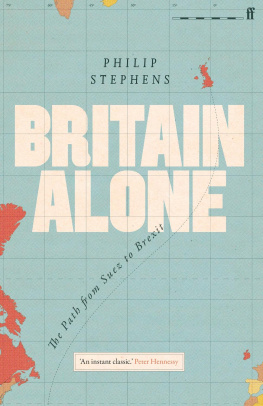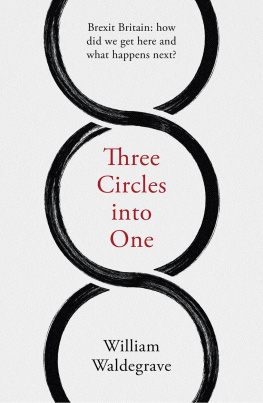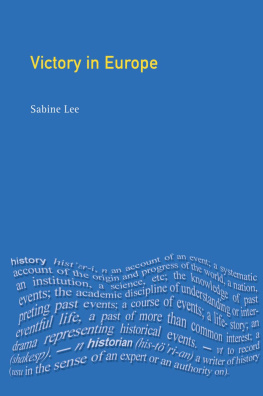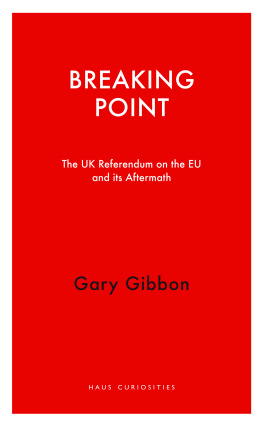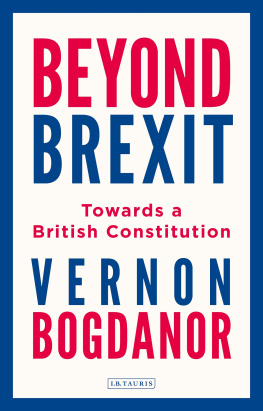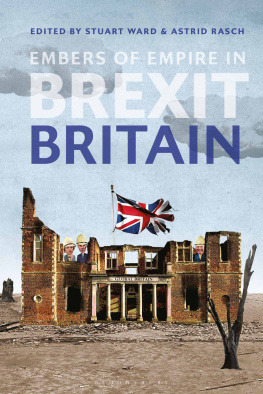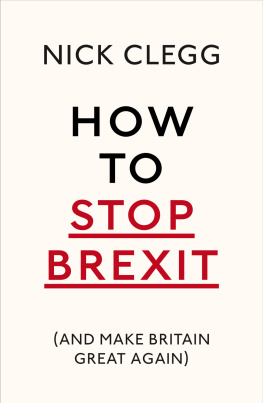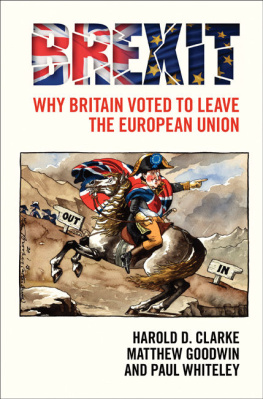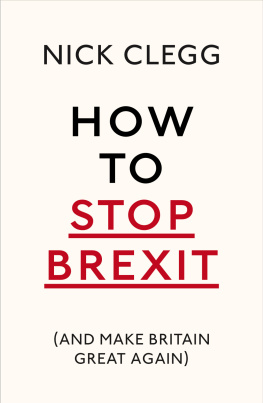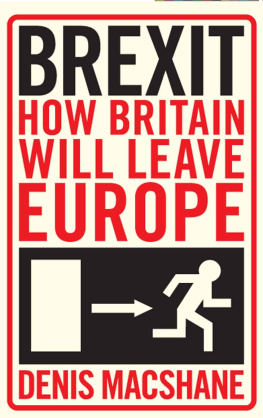Who controls the past controls the future: who controls the present controls the past.
The argument about Britains place in the world has been an ever-present backcloth for my work as a journalist at Reuters and the Financial Times. Writing since the 1980s about our islands tortured relationship with Europe and its sometimes embarrassing obeisance to Washington, I have constantly caught sight of the bigger story: a nation no longer at the centre of world affairs struggling to reshape its identity. This book, I hope, tells the story.
Britain won the war but lost its empire along the way. The Suez debacle laid bare the realities of post-imperial decline. Engagement in Europe, alongside a special relationship with the United States, for a time seemed to offer a workable balance, albeit an often uncomfortable one. With Brexit, however, Britain is striking out again on its own. Britain Alone is an account of the array of forces historical, political and economic, cultural and emotional that have made it so difficult for Shakespeares sceptred isle to settle for a role that at once matches its great strengths and admits the limits of national power.
My thanks go to successive editors of the Financial Times and the many superb colleagues whose knowledge and insights have helped shape my thoughts over so many years. Frederick Studemann, the FTs literary editor, offered wisdom and reassurance after reading the initial draft. Much of the second half of the book draws directly on scores, no, hundreds of my conversations, on-the-record and private, with prime ministers, ministers and mandarins during my career as a writer, columnist and an editor at the FT. After watching Margaret Thatcher fight to cut Britains budget contribution as a Reuters correspondent in Brussels, I then interviewed her as political editor of the FT. Longer trips to the home of the European Union were interposed with press conferences marking prime ministerial pilgrimages to the White House Rose Garden. More recently, as chief political commentator, I charted the falls of David Cameron and Theresa May. The FT gave me a ring-side seat at all the big moments in between, including Thatchers infatuation with Soviet leader Mikhail Gorbachev, Tony Blairs fateful war in Iraq and Camerons defeat by opponents whom he had once described as fruitcakes, loonies and closet racists, mostly.
As well as my FT notebooks, I have drawn on my two previous books one about the Conservative Partys tribulations with sterling and Europe, the other an account of Blairs premiership in charting Camerons route to Brexit and Blairs path to war. Special mention is given in the Select Bibliography to the vivid accounts of the post-war decades written by historians such as Peter Hennessy.
Many officials in Downing Street, the Foreign Office and beyond have been kind enough to talk to me more recently in order to provide contemporaneous accounts. Some I have been able to quote directly; many others have been obliged to wear a cloak of anonymity. My long experience of British civil servants that as well as being smart, overwhelmingly they are also generous and anxious to promote the truth has been confirmed. They are also loyal to their political mistresses and masters, even at moments when they despair at some of the decisions they are asked to implement. They have my sincere thanks. So too do the diplomats and officials in Berlin, Paris, Brussels and Washington who have drawn a picture for me of Britain through the eyes of its friends. I am grateful also to the Robert Bosch Academy for sponsoring a sabbatical in Berlin.
I grew up in the period covered by the first half of the book, conscious I was living through a decisive break with the past, but largely unaware of the pain this was inflicting on the nations ruling elites. Britain had grown used to reordering the world, to shaping events in far-flung colonies, dominions and dependencies. How many times we were reminded that it had stood alone against the Nazis in 1940. Adjusting to a world in which the Pax Britannica had given way to American leadership produced more than a cry of pain.
Those who are tempted to dig deeper into the post-war decades will find a number of rich histories of the leading players and turning points. I have highlighted the best of them in the Select Bibliography, as well as a number of the must-visit websites offering digitised collections of cabinet papers, prime ministerial correspondence and contemporary records of milestone events. I have devoured the accounts, diaries and memoirs of politicians, diplomats and journalists. I hope that I have done justice to the richness of the story they tell.
Felicity Bryan will be sorely missed. She was an inspirational agent. She never gave up on her charges and, in spite of a long gap since my last book, continued to nudge me along. If I have written something useful, Felicity takes the credit. Thanks too to Laura Hassan at Faber, who, having taken on the book, put up with several broken deadlines as my writing for the FT about the Brexit pile-up in parliament proved a constant distraction. Andrew Naughtie dug into the archives to produce some great research, and Rowan Cope, a superb editor, offered invaluable help in ordering my thoughts. I would also like to thank Ian Bahrami for his thoughtful and patient editing, and Chris Allnutt for his careful checking. Kate Ward brought it all together with skill.
For all the much-appreciated help I have received, the judgements, and any errors, belong entirely to me.
The alarm was sounded by a distinguished Whitehall scientist. Sir Henry Tizard had served during the war as a special emissary to Washington for Winston Churchill. His task had been to supervise the exchange of advanced military technologies, from airborne radar to nuclear fission, with Franklin Roosevelts administration. Tizard once made an Atlantic sea crossing carrying in his case the blueprints for every one of the nations secret weapons systems. By 1949, as the chief defence scientist for Clement Attlees government, his focus had shifted to Britains A great power or a great nation? Tizards prescient observation weaves its way through the history of post-war Britain. Britain Alone is a story of inflated ambition and diminished circumstance. Some called it managing relative decline. The Conservative foreign secretary Douglas Hurd preferred to talk about a nation punching above its weight in global affairs.
For all Britains enduring strengths its deep-rooted democratic traditions and culture, its language, geography and natural creativity the journey has been painful. Much of the time it has resembled a fight with history, a struggle to hold on to the past. The dissolution of an empire that in 1945 was still home to 700 million citizens left Britain in search of a new identity, in a world where other great powers made the rules. Political leaders were from time to time brave enough to present the country with the unvarnished choices offered by relative economic decline. More often, they sought to cling on to the illusions until they were overwhelmed by circumstance. To track the big shifts in Britains international standing has often been to note the unhappy coincidence of desperate attempts to prop up the value of sterling on international financial markets and an enforced retreat from political and security responsibilities overseas. Joining in 1973 what everyone called the Common Market might have promised a workable compromise between the pull of the past and the realities of the present. Hugging America close while claiming a powerful voice in the councils of Europe was a precarious balancing act, but it provided leverage in both Washington and Brussels. The decision in 2016 to leave the European Union means Britain has to start again.

